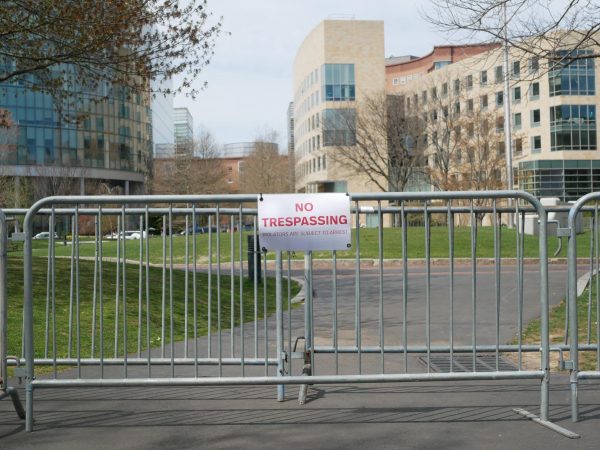Faculty Senate grills CIO on NU’s IT woes
Photo Courtesy/Brooks Canaday
December 4, 2018
Northeastern’s top information technology executive met with the Faculty Senate Nov. 28 to discuss his priorities for updating and improving the university’s technology infrastructure. Faculty members bemoaned the school’s outdated phone system and cumbersome online tools during the forum.
Cole Camplese, who began as Northeastern’s chief information officer and vice president for information technology five months ago, described his job as a “sprint” to keep up with the pace of technology and the needs of a campus that presents unique IT challenges.
“As an institution, we are just as mature and just as immature as all of the people that we work with across the country, just in different areas,” Camplese said. “We are so far out in front of so many people, yet so far behind so many people in other areas. That’s why this … is the most interesting CIO job in the country.”
Faculty members voiced dissatisfaction to Camplese about the state of the university’s existing IT systems.
“Nothing is automated. Nothing is web-based,” said Ozlem Ergun, an industrial engineering professor, who recounted spending “hours and hours” signing the same forms for hundreds of graduate students — a process she believed could have been improved by technology.
Computer science professor Peter Desnoyers blasted Northeastern’s online recruiting systems, noting that some departments avoid them entirely by using alternatives.
“One or two of the colleges have the tooling to work around … a couple university systems that are dreadful,” Desnoyers said. “The hiring system is unworkable for faculty searches. And the admissions system — I think it sucks too.”
Camplese said that replacing the university’s enterprise resource planning, or ERP, software — a suite of critical administrative and student information systems — could cost $70 to $100 million and take up to five years.
“It’s a tough slog, but that doesn’t mean we won’t go there,” he said, when asked about upgrading the software. “If we go there, stay tuned. It’ll be … 2023 [or] 2024 before you’d see a new ERP suite.”
Northeastern’s office phone system was another major concern for faculty members.
Mechanical engineering professor George Adams described being inundated with “robocalls often in foreign languages” on his office phone.
Jennie Stephens, a professor of public policy, suggested that the phones could be years behind industry standards.
“One functionality that I had at previous institutions four or five years ago that we don’t have is when someone leaves a voicemail, you get an email about it,” Stephens said. “[For] some of us who don’t sit in our offices very often, it takes time to check voicemail.”
Camplese said a university-wide phone upgrade is at the top of his list.
“It’s old copper wires and many parts are deteriorating underground,” he said. “When we make the switch to a unified communications platform, we’ll have more control. It’s the largest project we are working on right now.”
Despite the critical tone of the discussion, Provost James C. Bean said he is optimistic about NU’s IT future.
“Now, for the first time, I feel like we know what we need to do first and second and third and onward,” Bean said. “We’ll never get to where we want to be because technology is changing so fast … but at least we’re moving in the right direction.”


















